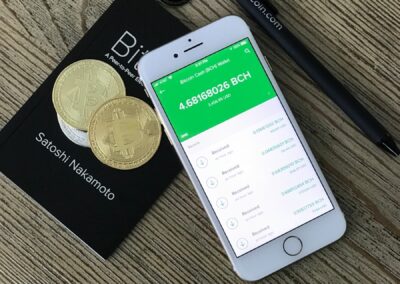The Role of Digital Assets in Shaping the Future of Virtual Economies
Introduction to Virtual Currencies
Virtual currencies in the metaverse, such as cryptocurrencies and in-game tokens, enable seamless transactions, facilitating trade and commerce within digital environments. As the metaverse continues to evolve, these digital assets are becoming integral to the virtual economy, providing a secure and efficient means of exchange. In regions like Saudi Arabia and the UAE, where technological innovation and digital transformation are key priorities, the adoption of virtual currencies is poised to drive significant advancements in various sectors, including finance, entertainment, and retail.
Cryptocurrencies, such as Bitcoin and Ethereum, are decentralized digital currencies that use blockchain technology to ensure secure and transparent transactions. In the metaverse, these cryptocurrencies allow users to buy, sell, and trade virtual goods and services without the need for traditional banking systems. This decentralization eliminates intermediaries, reduces transaction costs, and increases the speed of transactions. For cities like Riyadh and Dubai, where financial innovation is a focus, integrating cryptocurrencies into the metaverse can enhance economic growth and digital inclusion.
In-game tokens are another form of virtual currency used within specific digital platforms or games. These tokens can be earned, purchased, or traded by users to access premium content, virtual goods, or exclusive experiences. In the Middle East, where the gaming industry is rapidly growing, the use of in-game tokens can enhance user engagement and create new revenue streams. By leveraging blockchain technology, in-game tokens can be securely managed and traded, providing a trustworthy and efficient system for virtual transactions.
Facilitating Trade and Commerce in the Metaverse
The integration of virtual currencies in the metaverse is transforming the landscape of trade and commerce, enabling seamless transactions across various virtual environments. One of the primary benefits of using virtual currencies is the ability to facilitate cross-border transactions without the limitations of traditional financial systems. In regions like Saudi Arabia and the UAE, where international trade and commerce are crucial, virtual currencies can provide a more efficient and cost-effective solution for global transactions.
Moreover, virtual currencies enable the creation of decentralized marketplaces within the metaverse. These marketplaces allow users to buy, sell, and trade virtual goods and services directly with each other, without the need for intermediaries. This peer-to-peer trading model increases transparency, reduces transaction fees, and fosters a more inclusive economy. In cities like Riyadh and Dubai, where digital marketplaces are expanding, the use of virtual currencies can enhance the efficiency and accessibility of these platforms.
Blockchain technology plays a critical role in ensuring the security and transparency of transactions within the metaverse. By recording all transactions on a decentralized ledger, blockchain provides a tamper-proof and verifiable record of all virtual currency exchanges. This transparency builds trust among users and reduces the risk of fraud and manipulation. In the Middle East, where data security and trust are paramount, leveraging blockchain technology can enhance the reliability and credibility of virtual transactions.
Innovations Driving the Adoption of Virtual Currencies
The adoption of virtual currencies in the metaverse is being driven by several key innovations, including advancements in artificial intelligence (AI) and generative artificial intelligence (GAI). AI algorithms can analyze user behavior and preferences to create personalized and engaging virtual experiences. For instance, AI-powered virtual assistants can recommend products, services, and experiences based on a user’s interests and past interactions. In Saudi Arabia and the UAE, where AI adoption is rapidly progressing, integrating AI with virtual currencies can enhance user engagement and drive economic growth.
Generative AI is revolutionizing content creation in the metaverse by generating dynamic and personalized virtual environments. This technology can create realistic textures, environments, and avatars, significantly reducing the time and resources required for manual content creation. By using generative AI, developers can create immersive and engaging virtual experiences that attract and retain users. In regions like Riyadh and Dubai, leveraging generative AI for content creation can elevate the standard of virtual experiences and drive innovation in the metaverse.
Another significant innovation driving the adoption of virtual currencies is the development of decentralized finance (DeFi) platforms. DeFi platforms use blockchain technology to offer financial services such as lending, borrowing, and trading without the need for traditional financial intermediaries. These platforms provide users with greater control over their assets and access to a wider range of financial products. In the Middle East, where financial inclusion and innovation are key priorities, DeFi platforms can enhance access to financial services and support the growth of the digital economy.
Strategic Approaches to Integrating Virtual Currencies
Leveraging Blockchain for Secure Transactions
Leveraging blockchain technology is essential for ensuring the security and transparency of virtual currency transactions within the metaverse. Blockchain’s decentralized and immutable nature provides a secure and verifiable record of all transactions, reducing the risk of fraud and manipulation. For businesses and governments in Saudi Arabia and the UAE, integrating blockchain with virtual currencies can enhance the reliability and credibility of digital transactions, fostering trust and confidence among users.
Implementing smart contracts is another strategic approach to integrating virtual currencies. Smart contracts are self-executing contracts with the terms of the agreement directly written into code. These contracts automatically execute transactions when predefined conditions are met, eliminating the need for intermediaries and reducing the risk of human error. In regions like Riyadh and Dubai, where efficiency and automation are priorities, smart contracts can streamline virtual transactions and enhance the overall user experience.
Interoperability is also a key consideration for integrating virtual currencies in the metaverse. Ensuring that different virtual currencies and platforms can seamlessly interact with each other is crucial for creating a cohesive and functional digital economy. By developing standardized protocols and leveraging cross-chain technologies, businesses and developers can facilitate seamless interactions and transactions across various virtual environments. In the Middle East, fostering interoperability can enhance collaboration and innovation, driving the growth of the digital economy.
Promoting Adoption Through Education and Awareness
Promoting the adoption of virtual currencies in the metaverse requires a comprehensive approach to education and awareness. Users need to understand the benefits and risks associated with virtual currencies to make informed decisions. Educational programs and awareness campaigns can help demystify virtual currencies and highlight their potential applications in various sectors. In Saudi Arabia and the UAE, where digital literacy and innovation are key priorities, investing in education and awareness can support the widespread adoption of virtual currencies.
Providing user-friendly platforms and interfaces is another important strategy for promoting adoption. Simplifying the process of acquiring, managing, and using virtual currencies can enhance user experience and encourage participation in the digital economy. By offering intuitive and accessible platforms, businesses can attract a broader audience and drive the adoption of virtual currencies. In regions like Riyadh and Dubai, where user experience is paramount, developing user-friendly platforms can support the growth of the metaverse.
Collaborating with regulatory authorities is also essential for promoting the adoption of virtual currencies. Clear and supportive regulatory frameworks can provide businesses and users with the confidence to engage in virtual currency transactions. By working closely with regulators, businesses can ensure compliance and promote best practices in the use of virtual currencies. In the Middle East, where regulatory clarity is crucial for fostering innovation, collaboration with regulatory authorities can enhance the adoption and growth of virtual currencies.
Driving Business Success Through Virtual Currencies
Virtual currencies offer significant potential for driving business success in the metaverse by enabling new revenue streams and enhancing customer engagement. By creating virtual storefronts and marketplaces, businesses can attract and retain customers in a highly competitive market. AI-powered virtual assistants can provide personalized recommendations, while blockchain ensures secure transactions and ownership of digital assets. In Riyadh and Dubai, where retail and tourism are significant economic drivers, virtual currencies can enhance the customer experience and drive sales.
The use of virtual currencies can also support remote work and collaboration in the metaverse. Virtual offices and meeting spaces enable teams to collaborate in real-time, regardless of their physical location. This capability is particularly valuable in the wake of the COVID-19 pandemic, which has accelerated the adoption of remote work. In the Middle East, where global business connections are essential, virtual currencies can facilitate seamless collaboration and enhance productivity.
Furthermore, virtual currencies can foster a culture of innovation by providing a platform for experimentation and creativity. Virtual environments enable businesses to test new ideas and concepts without the constraints of the physical world. This capability is particularly valuable for startups and entrepreneurs, who can use virtual currencies to prototype and refine their products and services. In regions like Saudi Arabia and the UAE, where entrepreneurship is encouraged, virtual currencies can support the growth of innovative and agile businesses.
In conclusion, virtual currencies in the metaverse enable seamless transactions, facilitating trade and commerce within digital environments. By leveraging blockchain, AI, and generative AI, regions like Saudi Arabia, the UAE, Riyadh, and Dubai can drive innovation, enhance business success, and foster a culture of creativity and experimentation. As the metaverse continues to evolve, addressing technological and logistical challenges will be crucial for realizing its full potential and achieving long-term growth and sustainability.
—
#virtualcurrencies #cryptocurrencies #ingametokens #metaverse #trade #commerce #AI #blockchain #SaudiArabia #UAE #Riyadh #Dubai #moderntechnology























